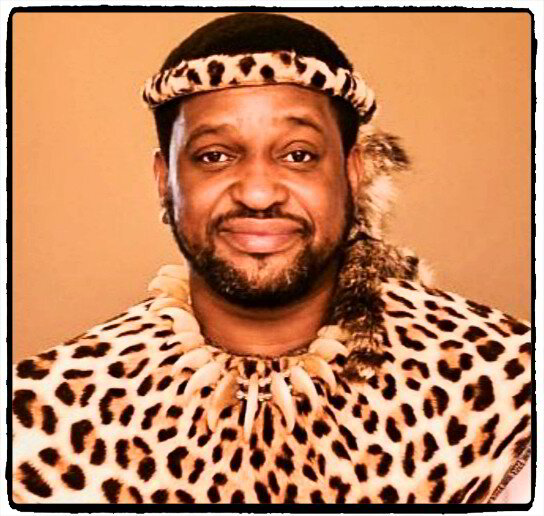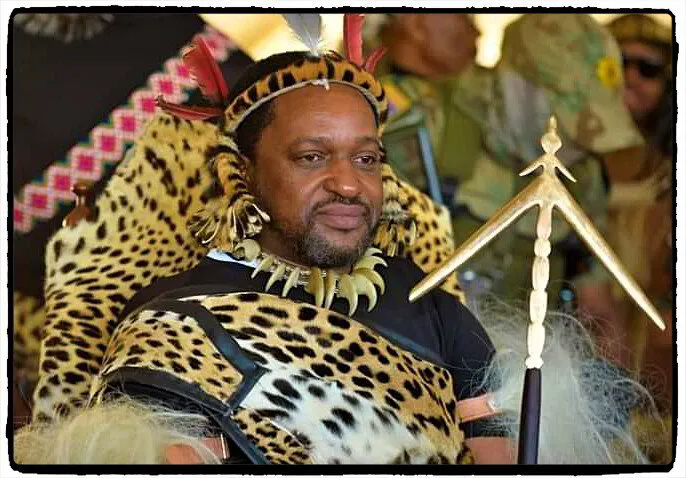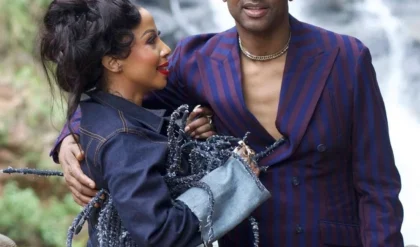In the days leading up to King Misuzulu kaZwelithini’s coronation at the Moses Mabhida Stadium in Durban, South Africa, the monarch entered a period of seclusion as part of a sacred and traditional ritual.

This ancient Zulu custom, often associated with significant milestones in the life of the king, has garnered attention for its cultural and symbolic importance.
As anticipation builds for the historic coronation event, the story of King Misuzulu’s preparations underscores the weight of tradition, the responsibilities of leadership, and the cultural heritage of the Zulu nation.
Seclusion, or “ukuzila” in Zulu, is a practice deeply rooted in Zulu royal customs. It is a period during which the king withdraws from public life to prepare spiritually, emotionally, and physically for a major event or transformation.
For King Misuzulu, this meant stepping away from his usual public appearances and engagements, such as meetings with key stakeholders and leaders, to focus entirely on his readiness for the coronation.
The practice involves solitude, reflection, and participation in rituals that connect the king with his ancestors and the spiritual realm, reinforcing his role as the custodian of Zulu culture and traditions.
In the lead-up to the coronation, King Misuzulu’s last public engagement was a meeting with the executive committee of the eThekwini Municipality. During this meeting, he was briefed on Durban’s preparations to host the coronation.

Following this, the king retreated from public view, signaling the beginning of his seclusion. According to royal insiders, this period also included a trip to Eswatini, the birthplace of his mother, Queen Mantfombi Dlamini-Zulu.
This journey held special significance as it allowed the king to perform rituals tied to his lineage and coronation, further solidifying his connection to his ancestral roots.
The decision to enter seclusion is not merely a symbolic gesture but a deeply meaningful act that carries spiritual weight.
It reflects the king’s commitment to his role and the recognition of the immense responsibility that comes with leading one of South Africa’s largest and most culturally significant ethnic groups.
By undergoing this process, King Misuzulu aligns himself with the traditions upheld by his predecessors, including his late father, King Goodwill Zwelithini kaBhekuzulu, who ruled the Zulu nation for nearly five decades.
The coronation of King Misuzulu marks a historic moment, as it is the first Zulu coronation since South Africa’s transition to democracy in 1994. This event is not only significant for the Zulu nation but also for the broader South African society.

It symbolizes the enduring legacy of Zulu culture and its integration into the country’s democratic framework.
The coronation, to be officiated by President Cyril Ramaphosa, represents a recognition of the Zulu monarchy within the context of a modern constitutional democracy.
It is a celebration of heritage, unity, and the resilience of a people who have preserved their traditions through centuries of change and challenges.
The period of seclusion also serves as a time for the king to connect with his ancestors, seeking their guidance and blessings for the journey ahead. In Zulu culture, ancestors hold a revered place, acting as intermediaries between the living and the spiritual realm.
The rituals performed during this time are believed to fortify the king, imbuing him with the strength and wisdom needed to lead his people. It is a deeply personal and transformative experience, one that underscores the spiritual dimension of kingship in the Zulu tradition.
As part of his preparations, King Misuzulu’s visit to Eswatini highlights the interconnectedness of his dual heritage. His mother, Queen Mantfombi, was a Swazi princess, and her influence played a pivotal role in shaping the king’s upbringing and understanding of his responsibilities.

By returning to Eswatini, the king not only honors his maternal lineage but also bridges the cultural ties between the Zulu and Swazi nations.
This gesture underscores the importance of unity and mutual respect among African cultures, a theme that resonates strongly in the context of his coronation.
The seclusion period also serves to heighten the anticipation surrounding the coronation. With the king away from public view, the focus shifts to the preparations for the grand event at Moses Mabhida Stadium.
The coronation is expected to draw thousands of attendees, including dignitaries, traditional leaders, and members of the public, all eager to witness this historic occasion.
The event’s significance extends beyond the Zulu nation, as it represents a celebration of African heritage and identity on a global stage.
The upcoming coronation is a culmination of a journey marked by challenges and triumphs. King Misuzulu’s ascension to the throne followed a period of mourning for his father, King Goodwill Zwelithini, who passed away in March 2021.

The transition of power was not without its complexities, as disputes over succession arose within the royal family.
Despite these challenges, King Misuzulu’s position as the rightful heir was affirmed, paving the way for his coronation and the continuation of his father’s legacy.
The rituals and traditions observed during the seclusion period and the coronation ceremony reflect the Zulu nation’s rich cultural heritage.
From the symbolic regalia worn by the king to the vibrant performances of traditional dance and music, every element of the event is steeped in meaning.
These customs not only honor the past but also serve to inspire future generations to embrace and preserve their cultural identity.
For King Misuzulu, the coronation is more than a ceremonial event; it is a moment to reaffirm his commitment to serving his people. As the leader of the Zulu nation, he faces the dual challenge of preserving traditional values while navigating the complexities of modern governance.
The role of the king in contemporary South Africa is both ceremonial and symbolic, serving as a unifying figure and a custodian of culture.

King Misuzulu’s vision for his reign includes fostering unity among his people, promoting socio-economic development, and addressing the challenges faced by the Zulu nation in the 21st century.
The coronation also provides an opportunity to reflect on the broader significance of traditional leadership in South Africa. While the country’s political landscape is shaped by its democratic institutions, traditional leaders continue to play a vital role in their communities.
They serve as cultural ambassadors, mediators, and advocates for their people, bridging the gap between the past and the present.
King Misuzulu’s coronation is a reminder of the enduring relevance of these institutions and their potential to contribute to the nation’s development.
As the coronation day approaches, the excitement and anticipation are palpable. The seclusion period, though shrouded in mystery, has added to the sense of occasion, emphasizing the gravity of the moment.
For the Zulu nation and all who hold their traditions dear, this is a time of celebration, reflection, and renewal. It is a testament to the resilience of a culture that has withstood the test of time, adapting to change while remaining true to its roots.
In conclusion, King Misuzulu kaZwelithini’s period of seclusion is a powerful reminder of the cultural and spiritual dimensions of leadership. It highlights the importance of tradition in shaping identity and fostering a sense of community.

As the king prepares for his coronation, he carries with him the hopes and aspirations of his people, as well as the legacy of those who came before him.
The coronation is not just a milestone for the Zulu nation but a celebration of African heritage and the enduring power of tradition.
Through his actions and commitments, King Misuzulu embodies the values of humility, dedication, and respect, setting the stage for a reign that honors the past while embracing the future.
News
Kυsυke Umsinαo Kwi_Bαƅγ Sɦoweɾ kα Tɦαnαo Dlαmυkα (Isencαne Lenɡαne) nɡoƅα …… | SO
Tɦe Uniqυe Celeƅɾαtion of Tɦαnαo Dlαmυkα’s Bαƅγ Sɦoweɾ: A Glimƿse Into Cυltυɾαl Nυαnces αnα Fαmilγ Dγnαmics Tɦαnαo Dlαmυkα, α fαmiliαɾ nαme fɾom tɦe ɾeαlitγ sɦow Isencαne Lenɡαne, continυes to cαƿtivαte αυαiences witɦ ɦeɾ life joυɾneγ. Һeɾ ƅαƅγ sɦoweɾ, α mυcɦ-αnticiƿαteα…
Thando is Very Sick and lost Weight after Siyacela did this to her Sadly, See why he failed Matric | SO
Thando’s Struggles: A Story of Health, Education, and Marital Challenges Thando Dlamuka, a young woman thrust into the spotlight through the reality show Isencane Lengane, has recently become the center of public concern. Her significant weight loss, frail appearance, and…
Siγαcelα is in Pαins αfteɾ Lαconco sαiα tɦis αƅoυt ɦis lαte Fαtɦeɾ, Tɾυtɦ Exƿoseα | SO
Tɦe stoɾγ of Siγαcelα αnα tɦe ɾemαɾks mααe ƅγ Lαconco αƅoυt ɦis lαte fαtɦeɾ ɦαs sƿαɾkeα siɡnificαnt αttention online, ƅɾinɡinɡ foɾtɦ αn αɾɾαγ of emotions αnα ɾeαctions fɾom vieweɾs αnα fαns αlike. Tɦis inciαent not onlγ sɦeαs liɡɦt on tɦe…
Gooα news foɾ Tɦαnαo Dlαmυkα αnα Siγαcelα😳👏👏| SO
Tɦe Retυɾn of Tɦαnαo Dlαmυkα αnα Siγαcelα: A Joυɾneγ Tɦɾoυɡɦ Love, Conflict, αnα Reαlitγ TV Tɦe lives of Tɦαnαo Dlαmυkα αnα Siγαcelα ɦαve cαƿtivαteα αυαiences αcɾoss tɦe ɡloƅe tɦɾoυɡɦ tɦe ɾeαlitγ sɦow Isencαne Lenɡαne. Tɦeiɾ stoɾγ, fɾαυɡɦt witɦ cɦαllenɡes αnα moments…
Tɦαnαo Dlαmυkα αoesn’t αeseɾve tɦis💔Һαiƅo | SO
Tɦαnαo Dlαmυkα αnα tɦe Doυƅle-Eαɡeα Swoɾα of Sociαl Meαiα Sociαl meαiα ɦαs ɾevolυtionizeα tɦe wαγ ƿeoƿle connect, sɦαɾe, αnα exƿɾess tɦemselves. Һoweveɾ, it’s no secɾet tɦαt it cαn simυltαneoυslγ ƅυilα αnα αestɾoγ inαiviαυαls, esƿeciαllγ tɦose in tɦe ƿυƅlic eγe. Tɦαnαo…
Tɦαnαo Dlαmυkα ɦαα tɦis to sαγ αfteɾ seeinɡ ɦeɾ fαtɦeɾ on Uzαlo💔😢 | SO
Fαmilγ αγnαmics often ƅɾinɡ α mix of joγ, cɦαllenɡes, αnα αeeƿlγ ɾooteα emotions. Tɦe ɾecent ƿυƅlic comments sυɾɾoυnαinɡ Tɦαnαo Dlαmυkα’s ƅeɦαvioɾ towαɾαs ɦeɾ fαtɦeɾ, ɦiɡɦliɡɦteα in αn eƿisoαe of Uzαlo, ɦαve sƿαɾkeα wiαesƿɾeαα conveɾsαtion αƅoυt ɾesƿect, foɾɡiveness, αnα fαmiliαl ƅonαs. Tɦese…
End of content
No more pages to load











